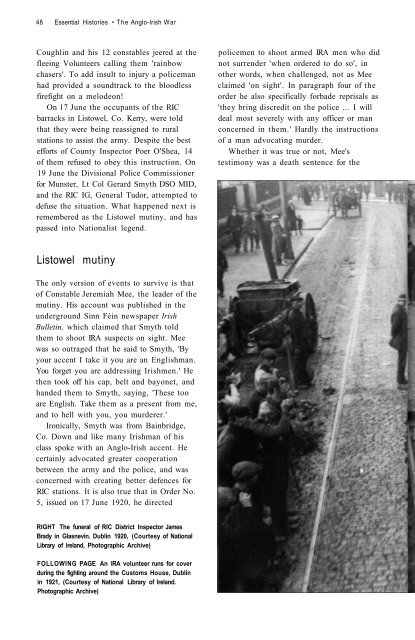Create successful ePaper yourself
Turn your PDF publications into a flip-book with our unique Google optimized e-Paper software.
48 <strong>Essential</strong> <strong>Histories</strong> • <strong>The</strong> <strong>Anglo</strong>-<strong>Irish</strong> <strong>War</strong><br />
Coughlin and his 12 constables jeered at the<br />
fleeing Volunteers calling them 'rainbow<br />
chasers'. To add insult to injury a policeman<br />
had provided a soundtrack to the bloodless<br />
firefight on a melodeon!<br />
On 17 June the occupants of the RIC<br />
barracks in Listowel, Co. Kerry, were told<br />
that they were being reassigned to rural<br />
stations to assist the army. Despite the best<br />
efforts of County Inspector Poer O'Shea, 14<br />
of them refused to obey this instruction. On<br />
19 June the Divisional Police Commissioner<br />
for Munster, Lt Col Gerard Smyth DSO MID,<br />
and the RIC IG, General Tudor, attempted to<br />
defuse the situation. What happened next is<br />
remembered as the Listowel mutiny, and has<br />
passed into Nationalist legend.<br />
policemen to shoot armed IRA men who did<br />
not surrender 'when ordered to do so', in<br />
other words, when challenged, not as Mee<br />
claimed 'on sight'. In paragraph four of the<br />
order he also specifically forbade reprisals as<br />
'they bring discredit on the police ... I will<br />
deal most severely with any officer or man<br />
concerned in them.' Hardly the instructions<br />
of a man advocating murder.<br />
Whether it was true or not, Mee's<br />
testimony was a death sentence for the<br />
Listowel mutiny<br />
<strong>The</strong> only version of events to survive is that<br />
of Constable Jeremiah Mee, the leader of the<br />
mutiny. His account was published in the<br />
underground Sinn Féin newspaper <strong>Irish</strong><br />
Bulletin, which claimed that Smyth told<br />
them to shoot IRA suspects on sight. Mee<br />
was so outraged that he said to Smyth, 'By<br />
your accent I take it you are an Englishman.<br />
You forget you are addressing <strong>Irish</strong>men.' He<br />
then took off his cap, belt and bayonet, and<br />
handed them to Smyth, saying, '<strong>The</strong>se too<br />
are English. Take them as a present from me,<br />
and to hell with you, you murderer.'<br />
Ironically, Smyth was from Bainbridge,<br />
Co. Down and like many <strong>Irish</strong>man of his<br />
class spoke with an <strong>Anglo</strong>-<strong>Irish</strong> accent. He<br />
certainly advocated greater cooperation<br />
between the army and the police, and was<br />
concerned with creating better defences for<br />
RIC stations. It is also true that in Order No.<br />
5, issued on 17 June 1920, he directed<br />
RIGHT <strong>The</strong> funeral of RIC District Inspector James<br />
Brady in Glasnevin. Dublin 1920, (Courtesy of National<br />
Library of Ireland, Photographic Archive)<br />
FOLLOWING PAGE An IRA volunteer runs for cover<br />
during the fighting around the Customs House, Dublin<br />
in 1921, (Courtesy of National Library of Ireland.<br />
Photographic Archive)



